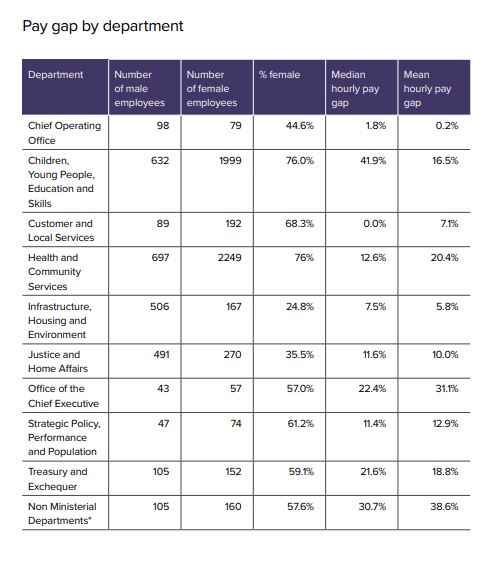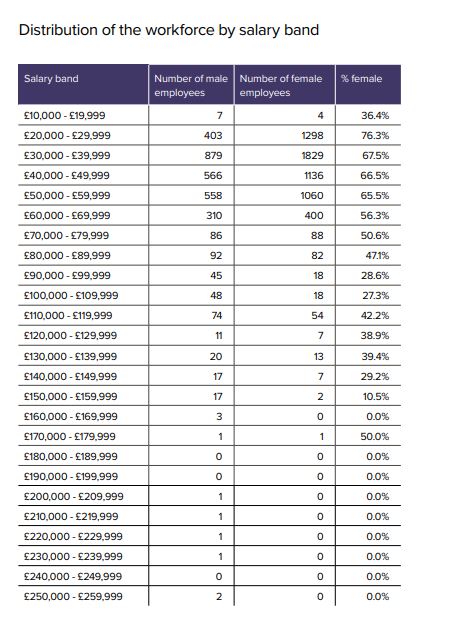
Women working for the States of Jersey earn an average of 24.3% less than men.
That compares to 18.3% in 2019.
The States Employment Board has published its 2020 figures, showing the difference in average pay between all men and woman in its workforce.
The difference in the average (median) pay between men and women in the civil service is 24.3%. It is not a measure of the difference in pay between males and females doing the same job. The government has previously said all departments pay equally for the same roles within a pay group, regardless of gender.
It indicates the contrast in the earning potential of women within the public sector, compared to men.
The latest report shows a 30% hourly pay gap in non-Ministerial departments, a 22% gap in the office of the Chief Executive, and a 21% gap in the Treasury Department.

Only one female earns more than £170,000 a year. Six males earn more than £200,000.

Underlying causes for the gap include a high percentage of the part-time workforce being female, women and men studying for certain roles or applying for certain jobs, and more men being employed in higher-paid jobs.
The mean pay gap has gone down from 18% to 15.2%, but the median (midpoint) average has gone up from 18.3% to 24.3%.
Reasons given for the increase include employing GPs to help with the coronavirus pandemic and more support roles in the lower tiers.
The government says closing the gap will take a long time, but they will continue to remove barriers to improving the gender balance and diversity.
Commitments include:
- More support for flexible working
- Improving parental leave offerings
- Removing biased language in job descriptions
- Launching new entry talent programmes that challenge the gender bias towards certain roles.
"We are aware of historic issues of pay inequality between different pay groups, which we began addressing through differential pay offers in January 2021. In broad terms, this means that we have given, on average, higher pay increases to lower-paid groups, such as nurses, midwives and manual workers, than to higher-paid groups, such as civil servants. This supports our aim to ensure pay parity but will also help to close the pay gap in some areas. This work will be taken forward into future negotiations to deliver parity across roles, regardless of the gender of the post-holder.
"Our current terms and conditions of employment and supporting policies are under review, to ensure that we are supporting employees with caring and domestic commitments, by offering flexible working solutions and encouraging agile working.
"We will invest in long-term programmes such as talent and leadership development and will be looking at how we tackle social and cultural challenges and unconscious bias in the workplace through our talent and attraction 14 15 strategy. The Team Jersey programme will continue coaching sessions with senior managers and supporting leadership in building development plans for departments to embed the organisation values and behaviours to build a positive workplace culture.
"The ‘I WILL’ initiative, overseen by a steering group of male and female colleagues from a range of grades and departments, aims to increase the
number of women in senior leadership positions and create opportunities for women to develop and connect across the organisation. A programme of work has been developed to support women in their career progression, professional development and to support ongoing activity to make the Government of Jersey an exemplar and employer of choice for women. A mentoring and coaching scheme for colleagues has been established, and this reopened for applications from both mentors and mentees in January. I WILL has partnered with Board Apprentice to run a pilot scheme aiming to increase board member gender diversity across the public sector, arm’s length organisations (ALOs), and wider States-owned bodies. The initiative ran a programme of virtual skills and learning sessions during 2020 and will deliver a full suite of speakers and topics in 2021, covering subjects such as Leading Virtually, Building Resilience and Effective Negotiation. I WILL plans to launch its delayed shadowing scheme this year which will provide a great opportunity for employees to build new skills and gain insight into other areas of the business and the leadership style of senior colleagues."
Before the first government pay gap report in 2019, the Gender Pay Gap Review Panel said there was a 'glass ceiling' that is stopping women from reaching senior positions.


 DFDS brings in replacement ship for Portsmouth sailings
DFDS brings in replacement ship for Portsmouth sailings
 100 days until Orkney Island Games begin
100 days until Orkney Island Games begin
 £200k padel facility coming to Les Ormes in May
£200k padel facility coming to Les Ormes in May
 Two islanders trapped in a lift rescued from sixth-floor fire on the Esplanade
Two islanders trapped in a lift rescued from sixth-floor fire on the Esplanade
 Rooftop bar, climbing wall and concert hall in £110m Fort Regent plans
Rooftop bar, climbing wall and concert hall in £110m Fort Regent plans
 3m tall substation and bin store proposed for Gorey promenade
3m tall substation and bin store proposed for Gorey promenade
 European visitors now need permit for UK entry
European visitors now need permit for UK entry
 Islanders can catch some winter sun with direct flights from Jersey to Tenerife
Islanders can catch some winter sun with direct flights from Jersey to Tenerife

